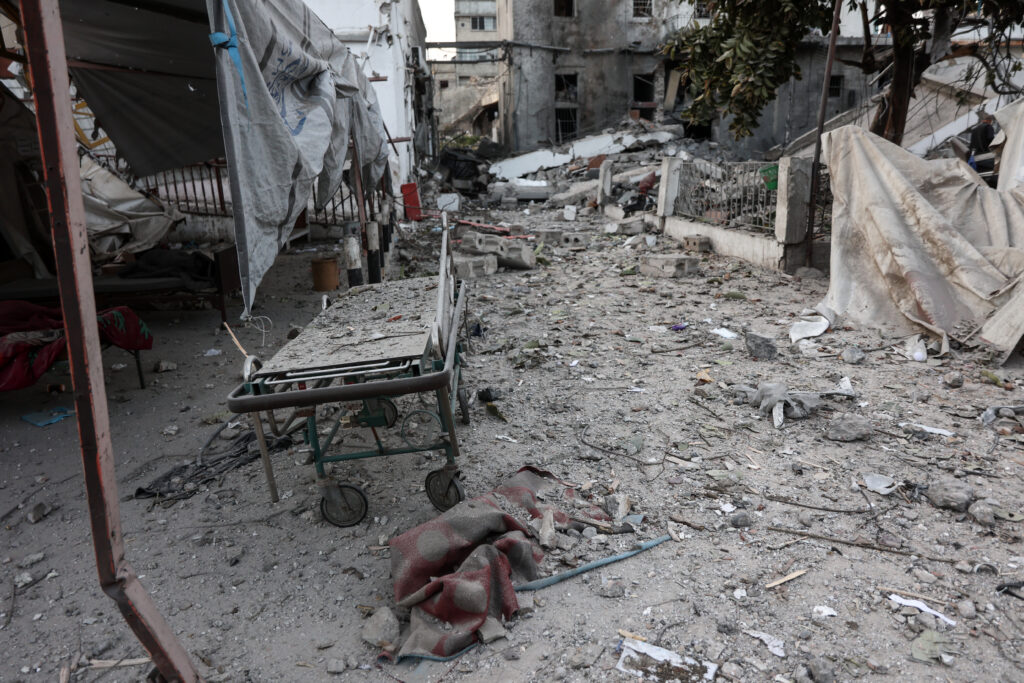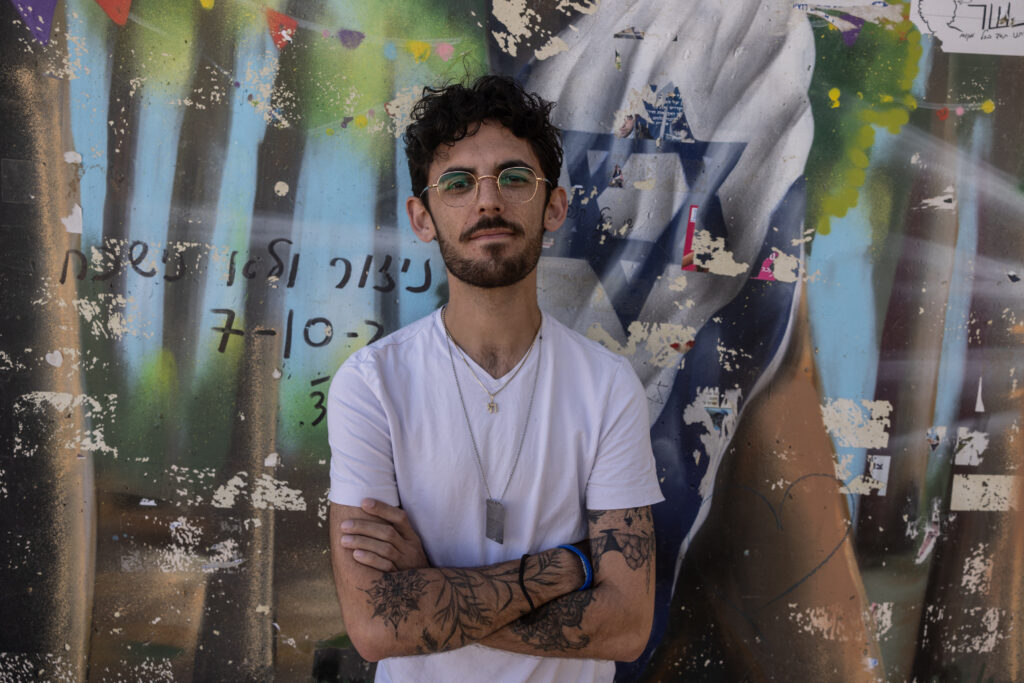AFP Asia Business
Chinese exports soared in March ahead of Trump’s ‘Liberation Day’
China said Monday that exports soared more than 12 percent last month, beating expectations as businesses rushed to get ahead of swingeing tariffs imposed by US President Donald Trump on his so-called “Liberation Day”.Beijing and Washington have been locked in a fast-moving, high-stakes game of brinkmanship since Trump launched a global tariff assault that has particularly …
Chinese exports soared in March ahead of Trump’s ‘Liberation Day’ Read More »
WHO says child dies after Israel strike hits Gaza hospital
An Israeli air strike Sunday hit one of Gaza’s few functioning hospitals, resulting in the death of a child according to the World Health Organization, as Israel warned it would expand its offensive if Hamas does not release hostages.Since the outbreak of war, tens of thousands of Gazans have sought refuge in hospitals, many of which have suffered severe damage in the ongoing hostilities.”A child died due to disruption of care” at the Al-Ahli Hospital in northern Gaza after a strike, WHO chief Tedros Adhanom Ghebreyesus said on X.”The emergency room, laboratory, emergency room X-ray machines and the pharmacy were destroyed,” he added. “The hospital was forced to move 50 patients to other hospitals. 40 critical patients couldn’t be moved.”The Israeli military said it targeted a Hamas “command and control centre” at the hospital, a claim the Palestinian group denied.Gaza’s civil defence agency said the strike came “minutes after the (Israeli) army’s warning to evacuate”.Israel’s foreign ministry said there was “no medical activity taking place” in the hospital building hit by a “precise strike”.”There were no civilian casualties as a result of the strike,” it added on X.AFP photographs showed massive slabs of concrete and twisted metal scattered across the site after the strike.The blast left a gaping hole in one of the hospital’s buildings, with iron doors torn from their hinges.Another air strike Sunday on a vehicle in the city of Deir el-Balah killed seven people including six brothers, the civil defence agency said.- Patients on streets -Israeli Defence Minister Israel Katz reiterated Sunday that the military would expand its offensive if Hamas “persists in its refusal” to free the remaining hostages. “Gaza will become smaller and more isolated, and more of its residents will be forced to evacuate from the combat zones,” he said, adding that hundreds of thousands had already evacuated.Patients, relatives and medical personnel found themselves stranded in the streets after the strike on Al-Ahli hospital.Naela Imad, 42, had been sheltering at the hospital but had to rush out of the complex. “Just as we reached the hospital gate, they bombed it. It was a massive explosion,” she told AFP. “Now, me and my children are out on the street… The hospital was our last refuge.”Hamas condemned what it described as a “savage crime” committed by Israel.Qatar, which helped mediate a fragile ceasefire between the warring parties that fell apart last month, denounced it as “a heinous crime”, as did Saudi Arabia.Also on Sunday, Israeli Prime Minister Benjamin Netanyahu criticised French President Emmanuel Macron for advocating a Palestinian state.”President Macron is gravely mistaken in continuing to promote the idea of a Palestinian state in the heart of our land — a state whose sole aspiration is the destruction of Israel,” Netanyahu said in a statement.Macron, in an interview to France 5 this week, stated that France could take the step at a UN conference in New York in June, saying he hoped this would trigger a reciprocal recognition of Israel by Arab countries.- Hospitals targeted -Hospitals, protected under international humanitarian law, have repeatedly been hit by Israeli strikes in the Gaza Strip since the start of the war after Hamas’s October 7, 2023 attack on Israel.Al-Ahli was heavily damaged by an explosion in its car park on October 17, 2023 that caused multiple fatalities.British Foreign Secretary David Lammy urged Israel on Sunday to halt the “deplorable attacks” on hospitals.Last month, Israeli forces opened fire on ambulances in Gaza, killing 15 medics and rescuers in an attack that sparked international condemnation.The Palestine Red Crescent Society said Sunday that a medic who had been missing since the attack, Asaad al-Nsasrah, was “being held by Israeli authorities”.The Gaza war broke out after Hamas’s October 2023 attack on Israel which resulted in the deaths of 1,218 people, mostly civilians, according to an AFP tally based on Israeli official figures.Gaza’s health ministry said Sunday that at least 1,574 Palestinians had been killed since March 18 when the ceasefire collapsed, taking the overall death toll since the war began to 50,944.The ceasefire had largely put a halt to the fighting in Gaza for two months, but Israel restarted intense strikes in mid-March, with Palestinian militants resuming rocket fire from the territory days later.The Israeli military said Sunday that it intercepted a projectile launched from Gaza. Later on Sunday, it said it had also intercepted a missile launched from Yemen.Yemen’s Iran-backed Huthi rebels, who say they are acting in solidarity with Palestinians in Gaza, said they had fired two ballistic missiles on Israel, including one that targeted Ben Gurion airport.
From deadly rave to recovery: Israeli study examines MDMA’s effect on trauma
Artillery fire echoed from nearby Gaza as Shye Klein-Weinstein slowly walked around a memorial honouring the nearly 400 people killed at the Nova music festival in Reim, southern Israel, on October 7, 2023.The 28-year-old photographer and survivor of Hamas’s attack recalled names and events from that fateful day — some of which he captured on film, documenting the final moments of his fellow revellers.Klein-Weinstein, an immigrant from Canada who had arrived in Israel just four months prior to the attack, also recalled another detail from the festival: taking ecstasy.While still visibly shaken by the horrific experience, early findings from a study by researchers at Israel’s Haifa University suggest that the MDMA Klein-Weinstein and others at the festival took that night may have been helpful in cushioning the impact of the trauma they endured.”I came to the Nova with my cousin and several friends… It was my first music festival ever,” Klein-Weinstein told AFP. They “each took a half or a quarter pill of ecstasy”, he said, going on to describe the unfolding chaos and his frantic escape.- New findings -The Haifa University study, which monitored 657 Nova survivors — both those who took drugs and those who did not — found in initial results that individuals under the influence of MDMA exhibited “significantly improved intermediate outcomes compared to those who were under the influence of other substances or no substances at all”.The study, which was recently accepted for publication in the World Psychiatry journal, noted that “the MDMA group reported increased feelings of social support, more social interactions and enhanced quality of sleep” after the event, “yielding reduced levels of mental distress and reduced PTSD symptom severity”.”That is a very unique finding — it was never reported before, because it was never studied before, because it never happened before,” said Roee Admon, one of the study’s lead researchers.Admon explained that while trauma research is well established, the attack on a gathering like the Nova festival has opened a new window into the effects of trauma under the influence of mind-altering substances.”We don’t know anything about the response to trauma when people, during the attack or traumatic event, are under the influence of specific substances like cannabis, alcohol, and psychedelics like LSD and MDMA,” he said, adding that such a mass trauma event, where around 4,000 people were exposed to the same elements at the same time, is rare.”I would feel like if something like that happened to me, I would want to be as much in control as possible, clean from any foreign influences or substances,” said Admon. “But that’s not what we found, and that’s why it was very surprising.”Still, Admon was quick to caution that while MDMA may have offered a psychological buffer, the overall levels of PTSD among Nova survivors remained extremely high.He also noted that the study was limited by “survivor bias”, as researchers cannot learn from those killed in the attack.- ‘Love drug’ -At the Nova memorial, Klein-Weinstein said he is still struggling with trauma and has been undergoing therapy. Still, he believes the MDMA he took that night may have eased his symptoms somewhat.But, he added, he did not want people to think MDMA “saved us or protected us… I don’t know anybody who didn’t die because they were on MDMA. They were just as vulnerable as anyone else, and we were all in the same situation.”Still, he continued, ecstasy is “known as the love drug. It makes you just want to hug your friends and dance and laugh and smile.””When everything was happening, I noticed that I wasn’t really afraid for myself,” he recalled.”The only concern I had was that I wouldn’t be able to help my friends or that something would happen to them, and I would be totally useless, unable to do anything — that was a terrible feeling, not being in control.”Vered Atzmon-Meshulam, a psychologist specialising in trauma and head of the Resilience Division at the rescue and recovery organisation ZAKA, told AFP she was not surprised by the study because previous research has suggested MDMA could help treat post-traumatic stress disorderIn 2023, Australia became the first country to legalise the use of MDMA to treat PTSD.”This research is very important for continuing to develop tailored responses for extreme trauma,” Atzmon-Meshulam said.”We must move forward to the next phase, which includes treatments that use psychedelics for healing in a true and widespread manner, not just for the people who were at Nova, but many others who suffer from post-trauma.”



